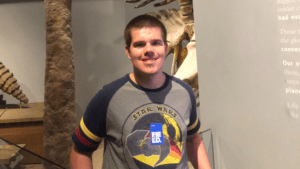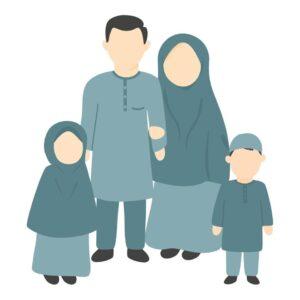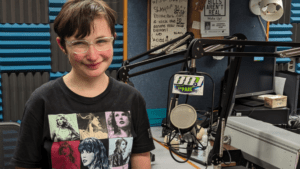This guest post is by Julia Elliott, a young woman on the autism spectrum who was accepted into Dallas College. Julia is applying for the Spring 2022 Making a Difference Autism Scholarship via the nonprofit KFM Making a Difference started by me, Kerry Magro. I was nonverbal till 2.5 and diagnosed with autism at 4 and you can read more about my organization here.
I was diagnosed with ASD at age 17.
For most of my life, I knew there was something different about me. I struggled to control my volume and never particularly understood personal space. I had a hard time keeping friends and found social gatherings to be overwhelming and difficult to navigate. In my young adult life, holding down a job for longer than six months has been difficult. I tried to fit in by mimicking the behaviors of my coworkers, but my attempts to connect alienated me even more.
My first realization that these struggles were actually symptoms of a disability happened one day with a family member. He told me I could buy some makeup at CVS, and when I asked him for a budget, told me, “just don’t go crazy with it,” and I soon had roughly $300 of drugstore makeup in my basket. This apparently made him angry and when he began screaming at me, I cried.
As I researched and poured over the common overlaps of ASD and ADHD, I was shocked by how similar these traits were to mine. If the road to an Autism diagnosis was like a 12-step program, this would have been the first step. In the months that followed, I analyzed other aspects of my life and found more personality quirks that fit with autism: I didn’t learn to walk until past the age of two, I had trouble reading facial expressions, I never could seem to keep a steady routine. And I experienced meltdowns that would take the form of crying or yelling.
By the time I was allowed by a family member to get tested at seventeen, I had achieved a level of acceptance and curiosity where I wanted to know for sure, but I also was terrified of how my life might change. Would the people I loved treat me differently if they found out? Would prospective partners be able to see past my autism and treat me normally despite it? Would I have to spend the rest of my life pretending not to be offended when someone is surprised when I’m smart?
Now, a few months later, I’ve gotten my answers in ways I didn’t expect. I am loved regardless by my family and friends, and I know how to communicate most obstacles I run into with them. I moved out and no longer have to be mocked, berated, and condescended by someone who thinks I am too smart to be disabled. My openness about my disability enabled me to allow others to try to understand me. And although I am open and proud of who I am, I am also very much aware of the obstacles that prevent other young women from being diagnosed and given the help they need at an age where it makes a significant difference. The fact is, medical professionals are misdiagnosing women and girls because the current testing model is based on findings from studies conducted almost entirely on boys.
There is one more factor that made my process of diagnosis all the more difficult. Since I wasn’t tested when I was young, I had to learn coping skills in a painful manner rather than a productive one; and some of the skills I have aren’t optimal for me, but since I have been doing them for so long, I can’t relearn my brain anymore. The fact is, I can’t wear headphones everywhere I go, and not every college professor will let me pace or stim when I need to. Diagnosing more children at a young age is crucial for setting autistic children up for success, and this is a prime example.
If you’ve read this far, thank you- it means a lot that someone who hasn’t even met me took the time to learn me even for a few moments. But, many do not get this luxury, and the only way we can combat it is to widely represent those of all ages, genders, and walks of life who share this label. It is high time we step away from the stigma regarding people like us. We are not Rainman, we are not ‘short bus kids’, and we certainly are not limited by our disability. We are abled differently-and in the same way there’s more than one way to skin a cat, there is also more than one way to think, process, and understand the world around us.
I hope you can support my nonprofit like I’m trying to support these students with scholarship aid for college. Learn more on how you can help our cause with a small donation (just asking for $3 today, equal to your daily cup of coffee) here.

Follow my journey on Facebook, my Facebook Fan Page, Tiktok, Youtube & Instagram,
My name is Kerry Magro, a professional speaker and best-selling author who is also on the autism spectrum that started the nonprofit KFM Making a Difference in 2011 to help students with autism receive scholarship aid to pursue a post-secondary education. Help support me so I can continue to help students with autism go to college by making a tax-deductible donation to our nonprofit here.














